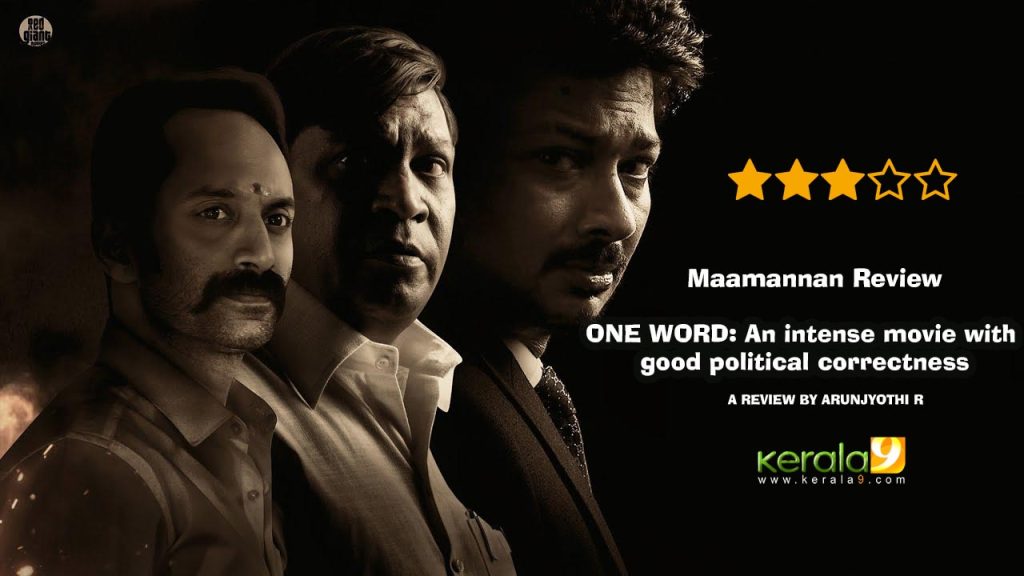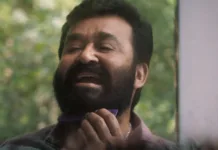
Maamannan Movie Review; An intense movie with good political correctness
- REVIEW BY ARUNJYOTHI. R
•Language: TAMIL
•Duration: 02 Hours 27 Minutes.
•Genre: Political Drama Thriller.
•Director: Mari Selvaraj
•Production: Red Giant Movies
•POSITIVES:
1: Direction
2: Music and background score
3: Performance of Fahadh Faasil
4: Performance of Vadivelu
5: Cinematography
6: Editing
7: Social relevant messages
8: Brilliant first half with terrific interval block
•NEGATIVES:
1: Predictable story
2: Second half lacks to give an impact
3: Udhayanidhi Stalin’s performance was unconvincing
4: The screenplay writing could have been focused more
5: Predictable climax
6: Average action scenes
•ONE WORD: An intense movie with good political correctness.
•STORY IDEA:
The plot of the story is happening in the Salem district of Tamil Nadu. Maamannan (Vadivelu) is an MLA from Kasipuram who is from a Dalit community. He lives with his wife and son Adhiveeran (Udhayanidhi Stalin) but Maamannan and Adhiveeran do not speak to each other for ten years. On the other hand, Rathinavel (Fahadh Faasil) is a strong leader in the political party of Maamannan who is rich and doesn’t like to see the growth of anyone coming from the lower community. So, the story will take a turn when Rathinavel disrespects Maamannan and it will lead to big political and caste discrimination conflicts.
•DETAIL REVIEW:
The film Maamannan is written and directed by Mari Selvaraj and produced by Udhayanidhi Stalin under Red Giant Movies. A.R. Rahman composed the music, Theni Eswar handled the cinematography and Selva R.K. did the editing for the film. The film has a duration of 155 minutes and with a U/A censor certificate, the film is currently running in theatres.
Pariyerum Perumal and Karnan are the last two previous films of Maari Selvaraj which talked bravely about caste discrimination and many political statements. Those two films were brilliantly executed by Maari Selvaraj and when ‘Maamannan’ was announced I was having huge expectations but after watching I would say that I am not completely satisfied. Maamannan is a good engaging film with much political correctness but unfortunately, I didn’t get a different cinematic experience that I expected from a director like Mari Selvaraj. The story and screenplay of Maamannan are something that we have seen before, the only difference made is the comeback of Vadivelu.
The filmmaking style of Maari Selvaraj always has something different and his last two previous works are proof of a different cinematic experience. The magic which Maari Selvaraj had created was not able to be fully seen in his third film Maamannan. The main reason for that is the second half, the first half was truly amazing but sadly the second half partially failed to maintain the impact. Till the interval the movie was served with many exemplary moments and the emotions in the characters were conveyed effectively. The writing and direction of Mari Selvaraj were having the right balanced depth and as a viewer, I was fully engaged with the first half. But the second half went mediocre and the flat writing of the screenplay was failing to give some incredible moments. The predictability in the second half was making my viewing experience dull, till the climax everything was like something as we have seen before.
The last few minutes of the climax were good, but the journey from the second half to the climax didn’t surprise or excite me. What was going to happen next was easily understandable, and the emotional bondage of the father-son combination of Vadivelu and Udhayanidhi Stalin was getting softer. The second half was more focused on political rivalries and the election campaign fights but all those scenes were following the regular template of many political movies. So, a thrilling and compelling cinematic mood was lost in me and the quality technical side and performances made the second half watchable. I wish the direction and writing in the second half could have been focused more. Still, the exceptional first half and the performance by Vadivelu and Fahahdh Faasil should be considered and these factors are the major winning factors of the film Maamannan.
The caste discrimination and the disrespectful caste ideologies which many people used to follow from old time was once again bravely told by Mari Selvaraj. The first half had some shocking scenes which were related to caste discrimination and it was cleanly directed by Mari Selvarj. Those scenes are thought-provoking and I believe that those scenes had the power to make anyone rethink. The intensity of the caste-oriented scenes in the movie was top-class, I was able to feel the pain and humiliation that the central character suffered. Also, I will appreciate Mari Selvaraj for showing the right political correctness, all those scenes were like an eye-opener which will teach anyone to rethink what’s right and what’s wrong. So the social messages in the film Maamannan were strong enough but the average and predictable second half was not allowing the graph of Maamannan to grow.
The flashback scenes in the film will shock you. I was stunned by seeing the visuals and I was thinking whether something like this had happened before real and if happened what will be the emotional damage caused? It’s hard to imagine, the flashback scenes in the first half were extraordinary. The black and white colour tune used for the flashback was also making the scenes more intriguing and compelling. The flashback scene also had the right synchronization with the present scenes. The father character played by Vadivelu doesn’t speak to his son for ten years. They live in the same house and I was wondering what would be the reason for that. Here, the cleverness of Mari Selvaraj was evident, the reason why the son character of Udhayanidhi Stalin doesn’t speak with his father was having proper valid reason and justification. The director Mari Selvaraj has subtly portrayed the struggles of a loving father, in the scene in which Vadivelu standing alone and crying and also struggling to take the right decision was magnificently shot. That particular scene made me emotional and the mental trauma of a leader and a father was seen beautifully. So during the entire first half, I was able to connect well with the writing and direction of Mari Selvaraj.
The first-half ending block is the next major highlight of Maamannan, it was unexpected and unpredictable. The power-packed interval block created a big impact and I thought it was a promising start for something big but sadly the second half turns unsatisfying. Vadivelu and Fahadh Faasil are the souls of this film because their outstanding realistic performances had given a great impact and they made this film engaging. Both of them showcased their real acting skills and how they understood their characters in a realistic way should be largely mentioned. The timing of the dialogue delivery by Fahadh Faasil was mind-blowing and his facial expression was priceless. The scene in which Fahadh suddenly shows anger and the mood-changing situation was flawlessly handled. Vadivelu as Maamannan shines throughout, the emotional side of his character was masterly acted out. The scenes in which he faces political discrimination were upsetting and the combination scene with Udhayanidhi Stalin showcased the love and care of a real father. Udhayanidhi Stalin as Athiveeran was a wrong choice, I didn’t like his performance because of his dull expressions. Also, the emotions in his character were not fully seen, and the action sequences looked weak. Keerthy Suresh did a fine performance and Lal as the Chief Minister did justice to his supporting role.
•MUSIC AND BACKGROUND SCORE:
The musical work for the film and the background score is composed by the legendary A.R Rahman. The song “Raasa Kannu” is my favorite among the seven songs in the album. The voice of Vadivelu and the powerful lyrics of Yuga Bharathi and the minimal orchestration tuned by A.R Rahman made the song magical and melodious. The four-note string tune in the song was taking my thoughts to lots of imagination and while hearing the song in the theatre I went extremely emotional. I’m sure the dominating singing by Vadivelu will melt your heart and now the song “Raasa Kannu” is on my personal hit list. The end credit song “Jigu Jigu Rail” sung by A.R. Rahman was superb, I enjoyed the chorus portion and the meaningful lyrics were catchy for the ears. The song “Kodi Parakura Kaalam” had a bang effect and made the introduction of Keerthy Suresh’s grand. The song “Veerane” sung by the son of A.R. Rahman worked well, the father-son energy was evident in the song. The vocals of Ameen matched rightly and the high points in the song were handled carefully. Another song “Manna Maamanna” sung by Arivu was enriched with rap vibes and it was fitting for the scenes.
The entire background score in the movie was excellent because the BGM was having a dominating power to influence us. The background tunes were flawlessly giving the feel and intensity of the scene so all the crucial scenes in the movie had the backup of many powerful background scores. A.R. Rahman was successful in giving the right tunes, I was able to connect well with many crucial scenes and I didn’t feel the background score went off-balance at any place. The Background tunes in the emotional scenes were brilliantly tuned, and also all the flashback scenes were packed with extremely remarkable background tunes to melt our hearts. Without thinking much I can strongly say that A.R. Rahman’s songs and background score for ‘Maamannan’ is one of his best and most brilliant works.
•TECHNICAL ASPECTS:
The cinematography by Theni Eswar is one of the major highlights of the film ‘Maamannan’. Each and every single frame in the film was having a predominant quality and it’s one of the best cinematography I have seen in recent times. The visuals were telling the story, and Theni Eswar was beautifully capturing the emotions in the characters. The close-up frames of Fahadh Faasil and Vadi Velu were in the right balance and everyone will be able to see the emotions present in them. The natural acting talent of Vadivelu and Fahadh Faasil was caught amazingly by the cinematographer and it was exhibiting their best acting skills. The wide-angle shots and the different placement of the camera had given a realistic vibe and what the director was trying to convey was given by Theni Eswar through his camera. Some of his shots and visuals in the flashback scenes were heart-touching and also shocking. So, overall Theni Eswar as a cinematographer had given his best with compelling and thought-provoking visuals.
The editing by Selva R. K. was good, the overall direction of 155 minutes didn’t feel as boring to me. The transition of scenes was smoother for viewing and the black and white colour grading for the flashback scenes had given an extra impact. A kind of emotional attachment was easily able to be felt and mismatches were never felt in the cuts. The action scenes in the film were unsatisfying, the character played by Udhayanidhi Stalin is a martial art trainer so the way he should fight must have some power but all his action sequences looked weak without any energy.
- CONCLUSION:
So overall, the film Maamannan has given me a fair watchable cinematic experience but I am not fully satisfied with the film. The direction of Mari Selvaraj was good but his writing of the screenplay turned out to be a half-baked cake. The film is having a brilliant second half followed by an average second half, sadly the drama didn’t have the right balance in the second half. The soulful realistic performance of Vadivelu and Fahadh Faasil is something which should be watched on the big screen. Therefore if you like to watch a decent political thriller drama the film Maamannan can be considered. But the magic of Mari Selvarj filmmaking which we saw in Karnan and Pariyerum Perumal can’t be seen in Maamannan.
•VERDICT: A WATCHABLE POLITICAL DRAMA.
•RATING: 3/5
- A REVIEW BY ARUNJYOTHI R



























